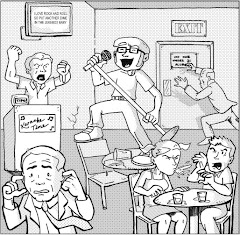Teen-age Love #30, February 1963, Charlton Comics
Blogger's note: Entry for Friday, February 15, 2008.
Dion and the Belmonts captured in song a question every man and woman asks themselves at that critical period of life: "Why must I be a teenager in love?" I envy the teenagers of the '50s and '60s; music, television, and comic books were downright therapeutic regarding issues of adolescent romance. I mean, the lyric, "One day I feel so happy/Next day I feel so sad/I guess I'll learn/To take the good with the bad?" Is there a verse that describes those emotionally tumultuous years better than that? What does today's youth have? Gossip Girl and R. Kelly's "Real Talk?" No wonder divorce rates rise with every passing generation.
I wonder if a comic book like Teen-age Love would make a difference nowadays. Based on the two stories in this issue, Teen-age Love didn't skirt the hard-hitting anxieties about teenage love, nor did it dodge the socially weighty topics that usually surround such matters of the heart. Consider this issue's lead story, "Beyond My Years," in which Jane falls for her middle-aged biology teacher who coincidentally begins to date her aunt. Jane, convinced that she had first dibs, tries to win Mr. Weeks' affections by pointing out her aunt's old age, and later by faking her own drowning at the beach. Mr. Weeks comes to her rescue but is disgusted by the false alarm. He resolves the situation by introducing Jane to his eligible nephew, who seems to share his irresistibility, but thankfully lacks the awkward years between Weeks' and Jane's ages.
Now, while Jane's mother dismisses her daughter's love as a harmless crush, Jane isn't really deterred by Mr. Weeks' age until the end of the story, when she's introduced to the wrinkle-free charms of his nephew. Had the shoe been on the other foot, and Mr. Weeks had admitted an affection for Jane, surely Chris Hansen would've made a cameo appearance in this issue (even if he hadn't been born yet). I mean, if Jane could fall for her beloved's nephew, why couldn't Weeks fall for his lady's niece? Ah, but age elicits clear-mindedness, and Mr. Weeks traded up in the family! See, Teen-age Love addressed the tough issues, and offered solutions that perfectly, not pervertedly, justified. For every pedophile that pursues a child, simply introduce him to the kid's aunt (or uncle, depending) -- and Dateline will have more time to pursue on-line identity thieves instead!
The second story in Teen-age Love #30 is a simple exercise in social class warfare and adolescent inadequacy. Jim Holden, teenaged mechanic, falls in love with Joan but doesn't want to pursue a relationship with her, afraid that her family wouldn't accept the lowbrow life of a self-taught greasemonkey. The joke's on him, though, when Joan's dad introduces himself as a renowned racecar driver, and the two get along swimmingly. The moral isn't so much "believe in yourself," as it is "cross your fingers and hope the girl you like has a family that already understands your potential for social inadequacy." If only my girlfriend's dad hosting a blog server or ran a comic book shop . . .
Alas, the lesson throughout Teen-age Love is relatively simple: when one is a teenager, one's biggest obstacle in finding and keeping love is usually oneself. As quick as an adolescent is to discover romance, he or she is usually just as quick to create some degree of drama between the discovery and the desired result. That's the difference between the kids in Teen-age Love and a 'tween-oriented television series like Gossip Girl; the kids in Teen-age Love couldn't live longer than just a few pages before finding a happy ending, whereas the kids on Gossip Girl are seemingly happy to endure a whole season of hardship before settling for a resolution. Kids today aren't living for the finale -- they're living for the cliffhanger. No wonder it's called falling in love, eh?
Monday, February 18, 2008
Subscribe to:
Post Comments (Atom)



1 comment:
Damn fine blog, man. Glad I stumbled upon it.
Real fun reading here!
Post a Comment